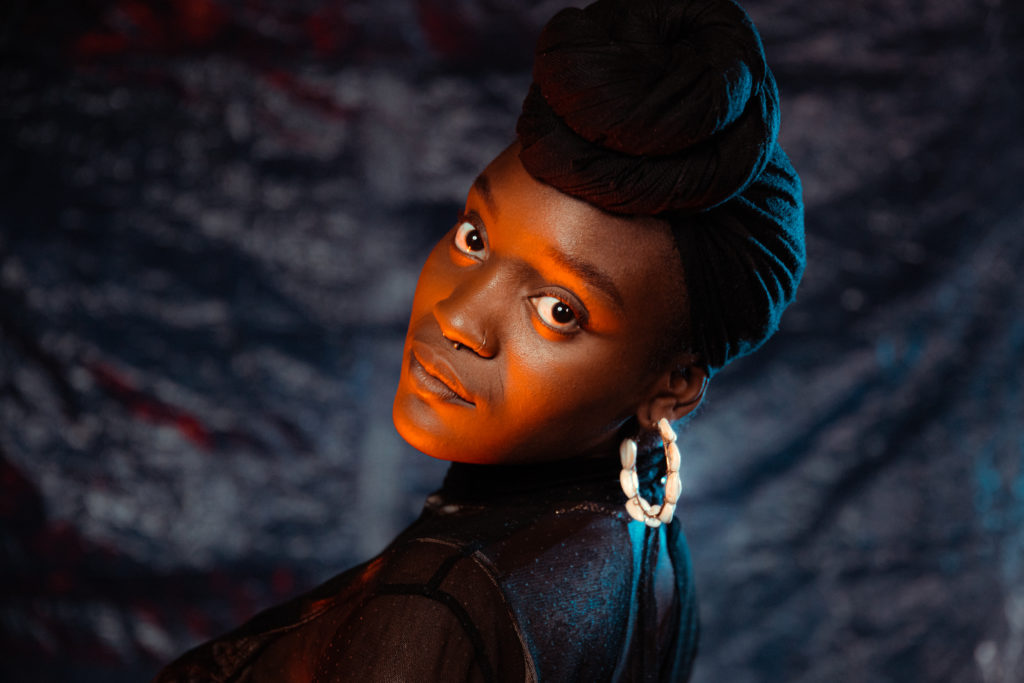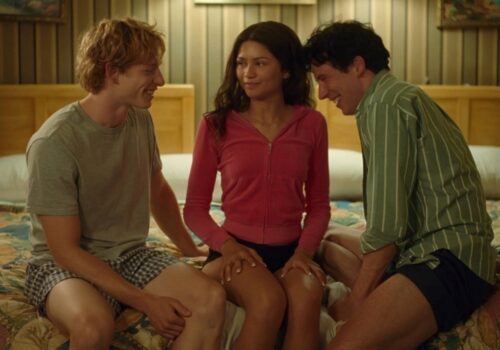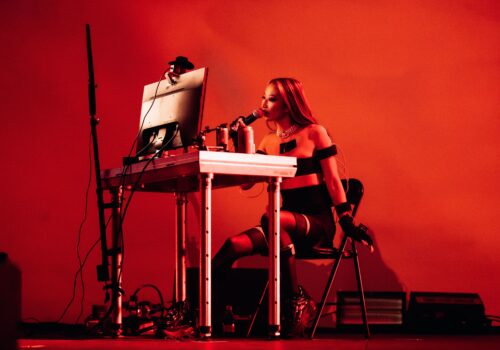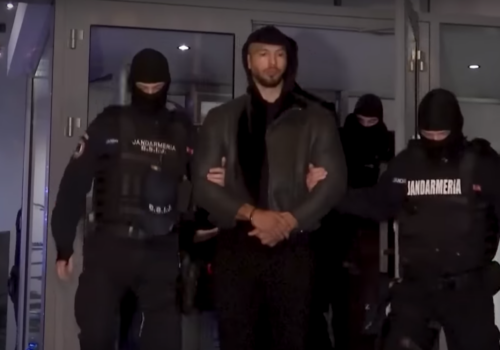Tolü Makay is going through a personal renaissance
Words: Katie Gartland
Photography: Bobby Zithelo
Words: Katie Gartland
Photography: Bobby Zithelo
Tolü Makay has been through a lot in the last few years. In the process of creating her new ep and cementing her career in music, she has taken time to reflect. She spoke to me about the journey of discovery she’s made.
We chatted over Zoom from her friend’s house in Maynooth, she had travelled from her home in Offaly for a short trip. I sat in the front room of the District offices, surrounded by our neighbouring businesse’s plants and occasionally interrupted by the scream of the Liffey’s seagulls.
After finishing an undergraduate degree in Psychology in NUIG, Tolü moved to Dublin from Tullamore and began a Masters at Trinity. Soon into her postgrad, she decided it wasn’t for her, she wanted to make music. Things moved quickly for her when she broke up with a long term boyfriend – she began to reflect on herself and her religion. She realised that she was acting as “two people in one”: who others saw, and who she actually was.

Last week, Tolü released her first ep, ‘Being’. She explained that ‘Being’ is about her journey of inward reflection, being “means your essence, your entity, your soul, your spirit”. The ep takes the listener through Tolü’s journey of self-love and growth. It starts with ‘Hello, Are you awake?’, an uplifting and reassuring song that acknowledges that bad things may happen in life. She said the song is a check-in, it asks how she is doing. Her insecurities are revisited throughout the ep while her confidence steadily grows until the last song ‘You are Enough’. She laughed when telling me the moment she realised “okay, I’m a bad-ass, I’m pretty sick.”
This growth and curiosity in her life began at the age of 19, when she started to question her strict Christian Pentecostal family upbringing. Tolü began making music in church, her musical roots were as a gospel singer. Tolü admitted that she never questioned authority as a child. “I was even used as an example of the good child”, she smiled.
The 1960s civil rights activist, singer and pianist Nina Simone is a huge influence for Tolü. She named ‘Blackbird’ as her favourite song by the artist. ‘Blackbird’ is a melancholic song that features just Simone’s voice with a driving African-inspired acoustic percussion line. The pessimistic lyrics, “you ain’t never gonna fly blackbird” drew Tolü in.
Tolü paused before acknowledging, “people don’t write songs like that anymore, where they’re being really honest about where they are”. Nina Simone’s unapologetic realism intrigued Tolü, whose musical background was centred around gospel. Nina Simone was a significant leader in the 1960s Civil Rights Movement, many of her songs, like ‘Young, Gifted and Black’, were in protest at the discrimination facing black people.
Black musicians are still voicing their thoughts in a new wave of protest music today. Tolü explained that “we’re black, this is our experience, this is our exterior, this is what people see first. So, with us being musicians or artists talking about our experiences, obviously we’re gonna talk about blackness and what we’re going through.”
When the Black Lives Matter Movement started, Tolü began to question expectations of herself. She realised that she hadn’t been true to herself in different aspects of her life. Though religion was one, she also had to unlearn expectations that were put on her as a black woman. Growing up in Tullamore, Tolü was the only black person in her class. She was surrounded by white people and what white people thought she should be. ‘Wild Thang’, the 6th song on ‘Being’, confronts these ideas.
Tolü described the moment of realisation that she had to unlearn the ideals that she had been boxed into.
“It’s removing all of these negative connotations that are used to explain what I am, because I am me first and foremost”
She explained that the word “wild” has negative connotations, “crazy, not well kept, or sporadic”. She said that black women’s hair is described as these things. Black women are expected to have a “certain texture, a certain curl and sleek edges” and a presentable look. The idea of perfect hair is not based on natural black hair, it’s based on white people’s hair. Going against the grain and being confident with natural hair or doing what you want with your hair is a political statement. Tolü laughed at the idea of these ideals for her hair; “I’m like no- if water touches my hair it’s literally all going crazy.” She adjusted her head scarf slightly, acknowledging that if her hair gets messy, “it’s fine, there’s nothing wrong with it.”

This year, Tolü also featured in the Irish Women in Harmony’s rendition of The Cranberries’ ‘Dreams’. The song was put together by the singer RuthAnne and released at the start of June. Tolü commented on the comradery that she had with her female contemporaries. The 38 artists worked together through Zoom meetings and at home recordings. She said when they first met and performed together in person on the Late Late Show, “I felt like I’d already known them, I felt like I’d already seen them, I felt like I’d already worked with them in the same space but we never met until that day”. The single made over €250,000 for Safe Ireland, but Tolü said they haven’t finished working together. She’ll be working with Irish Women in Harmony together with some young female collaborators to release an album over Christmas.
Tolü said that doing Irish Women In Harmony after the Gender Disparity Report was released made her realise that there were many more inequalities on Irish radio waves. She twisted her shell-covered hoop earrings, “we haven’t looked at genre, we haven’t looked at race… it was a big eye opener that we have so much yet to do in Ireland”.
Since beginning her musical career, Tolü Makay has made many self reflections to get where she is today. She moved away from secular religion and shut down expectations of herself as a black woman in order to be her own person. Though she has come a long way, she acknowledged that she still has a long way to go; “There’s still a lot of things that I have to look at with my personal journey. I don’t think you ever stop learning, especially when it comes to who you are and what you wanna do”.
Listen to ‘Being’ here:






